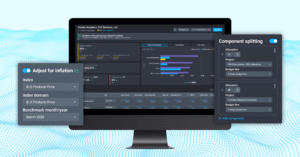The commercial real estate industry has relied for too long on outdated spreadsheets, gut-instinct decision-making, and siloed workflows to manage the complex development process. Now, amid contemporary market challenges, such as ongoing economic uncertainty, slow capital deployment, and constraints, or rising construction costs, the need to boost operational efficiency is increasingly urgent. Developers and investors looking to remain competitive amid these challenges are investing in PropTech solutions, benefiting from automation, real-time data, and smarter project strategies.
Embracing PropTech is not just about bringing on new tools – it’s shifting your commercial real estate team’s mindset toward faster, more effective, and informed decision making. Despite the real estate industry’s reliance on traditional but ineffectual workflows, there is a tidal shift coming. Change has been implemented gradually, but the COVID-19 pandemic and the rise of AI technology have accelerated the movement. The last two years have seen a greater demand for data-driven decision making and technology-driven insights are on the rise. Proptech companies are leading the way to a more transparent future by democratizing the availability of data and increasing the volume of information across market sectors.
Here, you’ll learn more about what Proptech is, what’s trending in the market, and how leaders can take advantage of these solutions to boost their own development process.
What Is Proptech? Its Role in Commercial Real Estate
Proptech is an umbrella term for B2C and B2B technologies that facilitate transactions in the real estate industry. Understanding what tools are effective on the leasing or tenant side and which tools are appropriate for developers or investment teams is essential for teams looking to overhaul their outdated operations. On the consumer-facing side, tenant and property management applications automate tasks related to leasing, rental payments, and maintenance requests. Similarly, virtual and augmented reality applications allow prospective residents to engage in immersive simulated property tours. During the height of the pandemic, those solutions gained popularity because they enabled business activity amid lockdowns and social distancing mandates.
On the business side, a range of new proptech platform types recently emerged to compliment decades-old legacy systems. The marketplace now includes aging force-fit tools and multifaceted solutions that support every phase of the real estate development process.
Here are a few examples:
On the consumer side (B2C):
B2C Proptech tools often include online platforms like Zillow or Apartments.com that let people search for rentals, schedule tours, and even sign leases. These are more appropriate for property management or other real estate operations that occur after project completion and stabilization.
On the business side (B2B):
Developers and asset managers use these tools to handle project budgeting, portfolio performance dashboards, and construction management workflows to keep large-scale projects on time and on budget.
- Accounting: Evergreen platforms like Yardi Voyager, MRI, Sage 300, and QuickBooks Online let project teams process invoices, pay vendors, and manage budgets.
- Contech: Construction technology is a relatively new type of software that provides general contractors with specific tools to manage all facets of their building activities more effectively.
- Building Information Modeling (BIM): BIM software is a 3D modeling tool that helps developers visualize and plan their projects.
- Data Analytics: Tools that generate real-time insights by processing internal and external data to cultivate strong decision-making. Best-in-class solutions in this category utilize artificial intelligence to eliminate manual data entry, automate reporting, and generate budget forecasts.
Proptech is also institutionalizing commercial real estate investment, moving the industry from fragmented entrepreneurs toward structured, transparent practices. Data transparency improves access to global markets and investment efficiency. JLL has been tracking market transparency over the last two decades, producing a global index report every other year. The report, in addition to monitoring data transparency, also tracks sustainability initiatives and government regulation, and has found significant improvements in market transparency over the last decade.
There are several common fears development teams have when it comes to integrating proptech into the development process. High-upfront costs or concerns about incorporating new tools into an existing tech stack are too common obstacles to widespread tech adoption in a firm. Investment in Proptech solutions is ultimately going to save your team time and boost efficiency, and deliver higher ROI on projects by keeping costs down and avoiding overruns across the product lifecycle.I ntegrations with existing software, such as accounting systems like Yardi or Sage Intacct, can also help minimize disruption in your existing workflows while delivering more value. The right Proptech solution will have a highly usable interface that encourages tech adoption and can work well with your existing tech stack.
Why Data Transparency Matters in Proptech Adoption
In the past, real estate development data analytics, including critical information about market performance, project risks, or asset value, have been difficult to asess, the information siloed with several stakeholders. Luckily, proptech is democratizing real estate information, sensors, digital dashboards, shared platforms, and API-driven systems are opening up real-time visibility into everything from energy usage to project budget performance.
Data is also undeniably playing an increasingly integral role in commercial real estate investing. Armed with data, stakeholders have transformed the commercial real estate industry from a fragmented entrepreneurial venture to an institutionalized investment market—and it has made investors hungry for more information. This is why data transparency is crucial. Creating a more transparent market through shared data and uniform gathering practices improves access to data and the accuracy of the information, driving transaction efficiency and mitigating investment risk.
Transparency has been a long time coming. Back in 2017, Northern Trust conducted a survey with 200 senior asset management and institutional investor executives, and more than 60% of both traditional and alternative investors listed transparency as the top investment consideration. Five years later, more investors are joining the fray. In reality, proptech is doing more than enhancing transparency; it actually facilitates transparency. The highest level of proptech adoption in the world is unsurprisingly in the markets considered “highly transparent” by the JLL index.
Proptech companies are collecting data in various ways, from building or city sensors that can track movement and traffic patterns to surveys or sourced information gathered through industry organizations like NAREIT and NMHC. Data availability is also boosted by non-standard and high-frequency data, which provide real-time insights.
Major Trends Shaping Proptech in Commercial Real Estate
Innovation in the world of commercial real estate technology is speeding up, and firms who adapt with proptech solutions will be set up to meet modern challenges and adapt to stay competitive. Investment in proptech has increased steadily since 2020, when the COVID-19 pandemic drove a rise in In 2024, venture capital investment in proptech reached $15.1 billion, marking a 32.5% year-over-year increase from 2023. Technology is driving both profitability and sustainability across the real estate industry, with new solutions boosting the efficiency and profitability of investments.
The rise of AI is driving a further adoption of proptech, with interest in the technology further boosting adoption across the industries. AI can be used for a variety of uses across the development lifecycle, helping address obstacles or pain points in manual processes such as underwriting, document management, market analysis, and tracking costs or vendor data. By automating real estate development workflows, Northspyre can help your development firm stay competitive in a rapidly shifting market environment.
Diversification and Innovation Cycles
The proptech landscape is diversifying rapidly, with specialized solutions emerging for various aspects of CRE development. From acquisition to completion, proptech is addressing pain points across the entire value chain. Leading CRE executives see adopting proptech not as a nice-to-have, but as the defining trait of truly future-ready development leadership. Isn’t it time you joined them?
Innovation cycles in proptech are accelerating, with new features and capabilities being released at an unprecedented pace. We’re witnessing a shift from annual update cycles to continuous improvement models, allowing developers to benefit from new functionalities as soon as they’re available. AI-driven analytics can forecast budget overruns by analyzing hundreds of data points from similar projects. This predictive capability is transforming how developers approach risk management and contingency planning.
Diversification in Proptech funding is on the rise in 2025, with investment in AI-driven solutions, tools for decreasing environmental impact, and fintech in particular on the rise. Proptech venture capital remained strong across Q1 of 2025, with $297 million invested across 27 companies, accounting for 48.4% of the global $615 million total, showing confidence in the sector’s continued growth.
Investor, Developer and Acquisition Team Workflows
Proptech is fundamentally changing how CRE teams work, breaking down traditional silos between departments and stakeholders. Acquisition teams now leverage data analytics to make more informed decisions about potential investments, using historical performance data and market trends to predict future returns. For developers, the impact is even more profound. A robust CRE investing platform can centralize investor communications and performance metrics. Project managers can track budgets in real-time, identify potential cost overruns before they occur, and maintain clear communication with contractors and subcontractors.
When your firm looks to bring on a new tool, there might be a need to balance your teams needs and expectations. Executives will want to see immediate impact and results on ROI, while your project managers or others on the frontlines of the development cycle may worry about disrupted workflows.
Investors benefit from unprecedented visibility into their investments. Rather than waiting for quarterly reports, they can access dashboards showing real-time project progress, budget utilization, and projected returns. This transparency builds trust and can make it easier to secure funding for future projects. However, adopting new tools will help incrementally balance these pressures, offering immediate wins without overwhelming teams. You’ll see instant value by automating tedious, time consuming processes, and the right tool will complement, not override, existing workflows and other tools in a tech stack, such as accounting tools.
As with their B2C counterparts, B2B proptech solutions gained significant momentum during the pandemic. Firms across the country eagerly embraced technologies that could help them take command amid an increasingly volatile landscape, prompting investors to put a record $9.5 billion into the sector. While increased competition in the sector provided developers with a broader selection of options, it also made finding the most PropTech platform for your team harder.
Read our blog for more on the latest trends in real estate technology and how your firm can identify the right solution for your needs.
Strategic Steps for Adopting Proptech in Your CRE Projects
At the bare minimum, a proptech software platform must offer commercial real estate developers increased operational effectiveness and a decreased administrative burden. But to achieve high-level benefits, meaning transitioning from performing business maintenance to accelerating growth, you need to look for solutions that provide competitive advantages to help your firm stay at the forefront of the industry. Once you understand how developers are leveraging big data, you can start looking to use these insights to boost your own process.
Here’s a few strategic steps you can take to adopt proptech in your CRE project:
- Identify your core operational pain points (cost overruns, communication breakdowns, delays).
- Set measurable success metrics like “20% faster budget approvals” or “30% fewer project change orders,” ensuring you’ll be earning higher returns through data analytics .
- Test new tools with pilot programs before full deployment.
- Prioritize user training so teams are confident and adoption sticks.
- Choose solutions that integrate easily with your current workflows (not disrupt them).
- Ensure vendors meet data privacy/security standards.
Quick Do’s and Don’ts:
- Do: Host stakeholder alignment sessions early.
- Do: Prioritize integrations with existing tools.
- Don’t: Skip user training or neglect the need for long-term support.
If you’re looking to see how proptech can transform your business, following the steps above is the perfect place to start.
Learn how these steps translate for your organization’s unique objectives and schedule a quick consultation today.
The Future of Proptech and Real Estate Development
Emerging Technologies and Software Advances
The proptech landscape continues to evolve rapidly, with several key technologies poised to transform CRE development in the coming years:
- Smart building technologies: IoT-enabled sensors and systems that monitor building performance in real-time, enabling predictive maintenance and energy optimization.
- Blockchain for transactions: Secure, transparent ledgers that streamline property transactions and reduce the need for intermediaries.
- Advanced AI and machine learning: Algorithms that analyze vast datasets to identify patterns and make predictions about market trends, property values, and development opportunities.
- Digital twins: Virtual replicas of physical buildings that enable real-time monitoring and simulation of various scenarios.
- Proptech software development: Custom solutions that address specific challenges in the CRE development process, from acquisition through completion and beyond.
Roadmap to PropTech Adoption
For CRE developers looking to implement proptech solutions, a strategic approach is essential. Here’s a roadmap for successful adoption:
- Assessment: Identify your organization’s specific pain points and areas where technology could create the most significant impact.
- Research: Explore available solutions, focusing on those that address your specific challenges and integrate with your existing systems.
- Implementation: Start with a pilot project to demonstrate value and gain team buy-in before rolling out across the organization.
- Training: Invest in comprehensive training to ensure all team members can effectively utilize the new technology.
- Continuous improvement: Regularly review and update your technology stack to take advantage of new features and capabilities.
Proptech solutions can drive value in many ways for your organization, supporting greater transparency with key project stakeholders, boosting overall operational efficiency, and leading to smarter decision-making for CRE leaders. Developers who adopt cutting edge technology will be better suited to meet contemporary challenges in the market, from market volatility to frequent staff turnover. Modern real estate development software like Northspyre help you reduce project risk and inefficiencies even across the largest portfolios, allowing you to uncover patterns in your data and establish benchmarks to enable cost-saving decision-making. AI and automation aren’t replacing jobs; they’re hoping CRE teams do their jobs faster, with more reliable insights and fewer manual tasks.
Book a demo and learn more about how Northspyre can turn your cost data into actionable insights that pinpoint missteps and boost returns.



